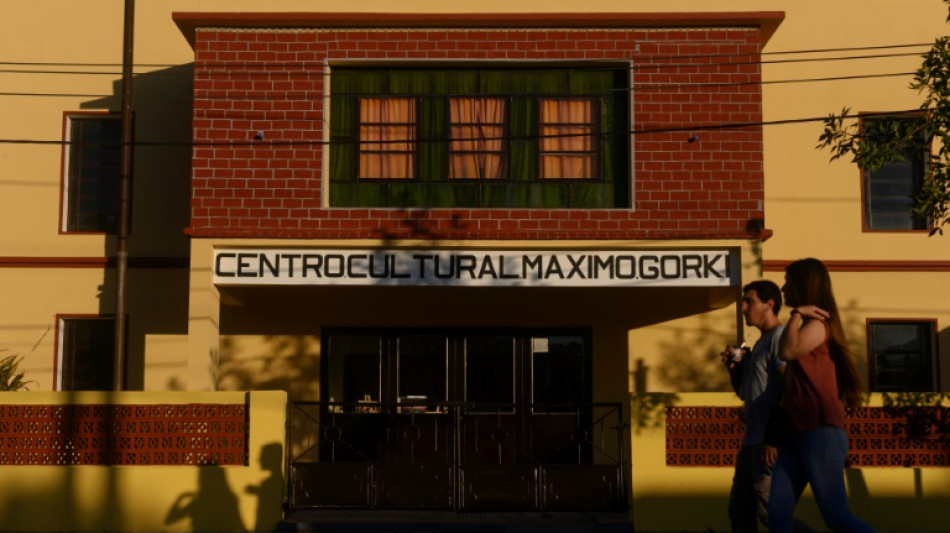
-
 Vance discusses migration during Vatican meeting with pope's right-hand man
Vance discusses migration during Vatican meeting with pope's right-hand man
-
Afghan FM tells Pakistan's top diplomat deportations are 'disappointment'

-
 British cycling icon Hoy and wife provide solace for each other's ills
British cycling icon Hoy and wife provide solace for each other's ills
-
Money, power, violence in high-stakes Philippine elections

-
 Iran, US hold second round of high-stakes nuclear talks in Rome
Iran, US hold second round of high-stakes nuclear talks in Rome
-
Japanese warships dock at Cambodia's Chinese-renovated naval base

-
 US Supreme Court pauses deportation of Venezuelans from Texas
US Supreme Court pauses deportation of Venezuelans from Texas
-
Pakistan foreign minister arrives in Kabul as Afghan deportations rise

-
 Heat and Grizzlies take final spots in the NBA playoffs
Heat and Grizzlies take final spots in the NBA playoffs
-
Iran, US to hold second round of high-stakes nuclear talks in Rome

-
 Humanoid robots stride into the future with world's first half-marathon
Humanoid robots stride into the future with world's first half-marathon
-
Migrant's expulsion puts Washington Salvadorans on edge

-
 Plan for expanded Muslim community triggers hope, fear in Texas
Plan for expanded Muslim community triggers hope, fear in Texas
-
Pakistan foreign minister due in Kabul as deportations rise

-
 White House touts Covid-19 'lab leak' theory on revamped site
White House touts Covid-19 'lab leak' theory on revamped site
-
Dodgers star Ohtani skips trip to Texas to await birth of first child

-
 US senator says El Salvador staged 'margarita' photo op
US senator says El Salvador staged 'margarita' photo op
-
Ford 'adjusts' some exports to China due to tariffs

-
 Thomas maintains two-shot lead at RBC Heritage
Thomas maintains two-shot lead at RBC Heritage
-
US to withdraw some 1,000 troops from Syria

-
 Four killed after spring storms wreak havoc in the Alps
Four killed after spring storms wreak havoc in the Alps
-
Spurs' Popovich reportedly home and well after 'medical incident'

-
 Trump goes to war with the Fed
Trump goes to war with the Fed
-
Celtics chase second straight NBA title in playoff field led by Thunder, Cavs

-
 White House site blames China for Covid-19 'lab leak'
White House site blames China for Covid-19 'lab leak'
-
Norris edges Piastri as McLaren top Jeddah practice

-
 Trump warns US could ditch Ukraine talks if no progress
Trump warns US could ditch Ukraine talks if no progress
-
Judge denies Sean 'Diddy' Combs push to delay trial

-
 80 killed in deadliest US attack on Yemen, Huthis say
80 killed in deadliest US attack on Yemen, Huthis say
-
Lebanon says two killed in Israeli strikes in south

-
 Trump says US will soon 'take a pass' if no Ukraine deal
Trump says US will soon 'take a pass' if no Ukraine deal
-
F1 success is 'like cooking' - Ferrari head chef Vasseur

-
 Cycling mulls slowing bikes to make road racing safer
Cycling mulls slowing bikes to make road racing safer
-
Macron invites foreign researchers to 'choose France'

-
 Klopp 'happy' in new job despite Real Madrid rumours: agent
Klopp 'happy' in new job despite Real Madrid rumours: agent
-
Alcaraz into Barcelona semis as defending champion Ruud exits

-
 Vance meets Italy's Meloni before Easter at the Vatican
Vance meets Italy's Meloni before Easter at the Vatican
-
Evenepoel returns with victory in Brabantse Pijl

-
 Maresca confident he will survive Chelsea slump
Maresca confident he will survive Chelsea slump
-
Mob beats to death man from persecuted Pakistan minority

-
 Lebanon says one killed in Israeli strike near Sidon
Lebanon says one killed in Israeli strike near Sidon
-
Arsenal's Havertz could return for Champions League final

-
 US officials split on Ukraine truce prospects
US officials split on Ukraine truce prospects
-
Client brain-dead after Paris cryotherapy session goes wrong

-
 Flick demands answers from La Liga for 'joke' schedule
Flick demands answers from La Liga for 'joke' schedule
-
'Maddest game' sums up Man Utd career for Maguire

-
 Trial opens for students, journalists over Istanbul protests
Trial opens for students, journalists over Istanbul protests
-
Gaza rescuers say Israeli strikes kill 24 after Hamas rejects truce proposal

-
 'Really stuck': Ukraine's EU accession drive stumbles
'Really stuck': Ukraine's EU accession drive stumbles
-
'Not the time to discuss future', says Alonso amid Real Madrid links


Uruguay's century-old Russian colony troubled over war from afar
Far away from Kyiv and even further from Moscow, residents of the small Uruguayan village of San Javier -- an old Russian settlement -- look on with dismay at the invasion of Ukraine.
At a first glance, the community's grid plan, low houses and surrounding fields resembles any other rural Uruguayan village -- but a scratch below the surface reveals the history of a site founded more than a century ago by Russian peasants.
Although few of their descendants speak Russian or even carry Russian names, the inhabitants here insist they are "proud" of their Slavic heritage, while also firmly denouncing the motherland's invasion of Ukraine.
San Javier has several Cyrillic inscriptions on display, a "Maximo Gorki" cultural center and five giant matryoshka dolls on the central square.
It all points to a history that is "unique in Uruguay and South America," says Leonardo Martinez, the deputy mayor of the village of 1,800 people.
San Javier's story began in 1913 when 300 families -- originally from Russia's western Voronezh region and followers of the "New Israel" Christian sect that was persecuted by Tsarist Russia -- arrived in Montevideo.
A few months later, around 600 people settled in San Javier, a five-hour drive northwest of Montevideo and flanked by the Uruguay River.
It was the largest autonomous Russian agricultural colony in South America, and quickly became a roaring success.
A century later, the sunflower -- which the colonists introduced to Uruguay -- appears everywhere as the village symbol.
"Looking at photos we feel a bit nostalgic... for the great sacrifice they made," said Martinez, 43, the great-grandson of an original settler.
The mayoral office claims a "high percentage" of the current inhabitants descend from the Russian colonizers, although over time the village has seen a blending of people and cultures, like the country as a whole.
The local restaurant offers the typical Uruguayan grilled meat "asado" as well as "shashlik," a type of lemon-seasoned skewered meat popular across much of the former Soviet Union.
The village square hosts Uruguayan creole folk dances as well as traditional Russian ones.
- Killing 'brothers' -
The village, which has its own museum, has become a tourist site for its Russian history.
But despite those ties, not a single flag or banner proclaiming partisanship can be found in its streets.
"I've not seen explicit support in San Javier" for either country, said Martinez about the war between Russia and Ukraine more than 10,000 kilometers (6,200 miles) away.
"We're against the war, that's obvious," he said. "Against all armed conflict."
Leonardo Lorduguin, a 22-year-old San Javier resident, has set up a Facebook page dedicated to his village.
He is fascinated by the Russian language, which he has been learning for two years -- one of the few of his generation to speak it.
But he would not commit to either side in the conflict.
Like many other villagers, he insists that the first settlers came from "Great Russia" -- an old term that includes territories outside the modern Russian borders.
"In 1913, only Russians came but some had Ukrainian names. They came to Montevideo and were told there was a Russian colony in San Javier," said Lorduguin, reeling off the Russian and Ukrainian surnames of some villagers.
Alejandro Sabelin, 80, is one of the only other villagers who speaks Russian alongside Spanish.
His father was born in San Javier three months after his grandparents arrived there.
He recognizes that the language is being lost in the community. His own children understand Russian better than they speak it.
A picture of his grandparents hangs in his small house.
"I'm really sorry about what is happening because it is almost like killing your brothers," he said of Russia's invasion of its neighbor.
Although he has never visited the homeland of his grandparents, Sabelin says, "I will never stop supporting Russia."
But "the war is awful, what's happening is horrible," he adds.
M.Odermatt--BTB


